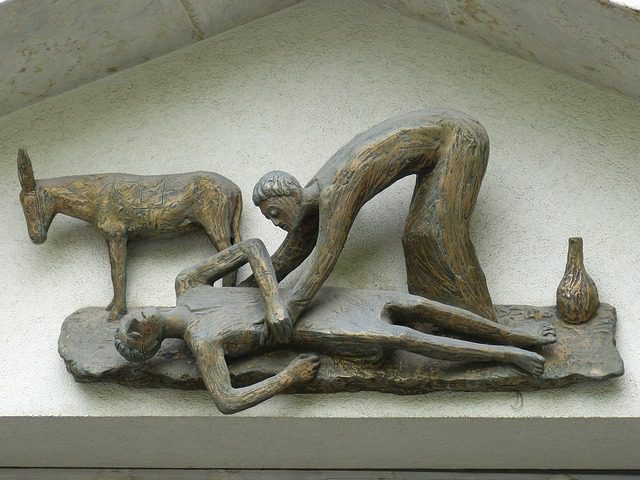
A reading from the Holy Gospel according to Luke:
There was a scholar of the law who stood up to test Jesus and said,
“Teacher, what must I do to inherit eternal life?”
Jesus said to him, “What is written in the law?
How do you read it?”
He said in reply,
“You shall love the Lord, your God,
with all your heart,
with all your being,
with all your strength,
and with all your mind,
and your neighbor as yourself.”
He replied to him, “You have answered correctly;
do this and you will live.”But because he wished to justify himself, he said to Jesus,
“And who is my neighbor?”
Jesus replied,
“A man fell victim to robbers
as he went down from Jerusalem to Jericho.
They stripped and beat him and went off leaving him half-dead.
A priest happened to be going down that road,
but when he saw him, he passed by on the opposite side.
Likewise a Levite came to the place,
and when he saw him, he passed by on the opposite side.
But a Samaritan traveler who came upon him
was moved with compassion at the sight.
He approached the victim,
poured oil and wine over his wounds and bandaged them.
Then he lifted him up on his own animal,
took him to an inn, and cared for him.
The next day he took out two silver coins
and gave them to the innkeeper with the instruction,
‘Take care of him.
If you spend more than what I have given you,
I shall repay you on my way back.’
Which of these three, in your opinion,
was neighbor to the robbers’ victim?”
He answered, “The one who treated him with mercy.”
Jesus said to him, “Go and do likewise.”
I once walked into an Orthodox Church, and was scared half to death, and this Gospel passage is to blame.
You see, I’ve always been a little cagey about the Parable of the Good Samaritan, for a rather eccentric reason. When I was in the second grade we made stick puppets out of straws to act out the parable, and the part of the injured man was played by a half-naked stick puppet lying on his side unconscious. There wasn’t a puppet of the man before his injury. You had to hold the puppet sideways for that part of the story, and pretend that he was walking from Jerusalem down to Jericho with a funny swayback, naked and with his eyes closed– or, you could do what our long-suffering teacher actually wanted, and start the dramatization after the first act, when the man was already lying half dead. Then we acted out the rest of the story– the Levite walked by, whoever that was, and the priest whom we could all picture because we’d seen priests. Then a Samaritan, an outcast, happened by and saved the poor victim. This part was easy; you just held the injured man puppet at waist-height to the Samaritan puppet. And then you handed him off to the innkeeper, who got his own puppet representation even though his part was not nearly as important as that of the victim. The Samaritan paid the innkeeper and then rode off into the sunset, promising to come back and settle his bill later.
And then, in my own improvised ending to the parable, the innkeeper waited until the Samaritan was out of sight. Then he dropped the injured man onto the ground with a hearty “Yuck!”
This counts as a funny joke when you’re in the second grade.
It did strike me as the strangest ending to a parable: that the hero of the story would abandon the critically injured, naked man at an inn and promise to come back, trusting the innkeeper wouldn’t do anything wrong. In the days before hospitals, I guess that’s what happened to people who met with misfortune on the road to Jericho if they didn’t just die. Someone would bring them to the nearest inn, and care for them themselves or trust the innkeeper to do it.
And what if he didn’t?
What if the innkeeper ended up being like the Thenardiers in Les Miserables, or Miss Minchin in A Little Princess, or worse? How could the Samaritan know he wasn’t? What if the innkeeper said “yuck!” and threw the victim away?
What would become of that helpless man?
This brings me to a few years ago, when I walked into an Orthodox church. I was gazing on the icons, and I came across the icon of the Good Samaritan. I saw that the Good Samaritan had a certain very distinctive marking on His halo, and the injured half-naked victim had a name written above his head. Thankfully it was in English and not Greek, because I can’t decipher Greek anymore than I can fly.
The injured man was called “Adam.”
And the markings on the Good Samaritan’s halo were the cross, omega, omicron, and nu that go only on the halo of Christ.
I looked this up when I got home, and it’s not unique to that particular icon. Eastern depictions of the Good Samaritan portray the Samaritan as really Christ and the victim as really Adam– us, sinful human beings in need of mercy. There are even prayers where you ask Jesus to pour on you the oil and wine, to heal you of your sins.
You and I are the man who met with robbers on his way from Jerusalem to Jericho. You and I are the naked and wounded victim who don’t remember a time when we could walk upright. We find ourselves in media res, already broken, waiting for help. Christ is the social outcast who came to pick us up when priests and holy men left us in the dust. He carries us to the inn, He pays the innkeeper and trusts there will be no foul play. And He goes away, promising to return and pay back what is owed.
This terrifies me.
This is how I have experienced the Church. I believe in Christ. He has been my only friend in the dark places I’ve been. When clerics and holy people walk by on the opposite side of the road, He comes to me and carries me forward on our journey. But there always comes a point where I find myself in a parish or a community and He doesn’t seem to be there. It’s as if He left me in the hands of these people, naively trusting that they’d do the right thing in His absence.
I can count more times that they haven’t, than that they have.
And I know plenty of people who have had a far worse time of it than I have– far worse than I can even imagine. I know people for whom the Church has been nothing from the beginning to the end but an inn where they went to find care for their wounds, and instead were neglected and abused until their faith died. I, myself, feel like my faith is hanging by a thread lately, and it’s not the Church that’s keeping that thread in place.
What if the Samaritan returns one day, and finds the injured victim starved to death or died of bedsores in his absence? What if he finds the victim was thrown out of the inn and died on the street because the innkeeper didn’t care? What if the innkeeper was a spiritual abuser, a sexual predator, or both?
He is returning to pay back what is owed, but when the Son of Man returns, will He find any faithful on the earth? And if He doesn’t, will that be the fault of the ones who died because those who had the power to help them were abusive?
He is the Resurrection and the Life, so we ought to have hope even if we die, but at this point it’s more than difficult. I don’t think He blames us for the difficulty, mind you. We’re not the ones who made it this way. I can’t imagine that He’ll be upset with people who left because of what was done to them– or because of the help they desperately needed, but weren’t given.
And there I go again, believing in Christ and His justice in spite of everything.
Maybe this is a hopeful parable after all– that wherever you are, in spite of the way that the clergy and the important people have abandoned or abused you, Christ will tend your wounds and pick you up, and carry you to a new place. And when they inevitably fail you again, He will pick you up and carry you again, and so on until the Last Day when He repays everyone for what they have done to the helpless.
And we as Christians must go and do likewise. Do not be like the clergy or the hierarchy. They have failed. Instead, be like Christ. Go out to the roadside and bring in those who have nothing, those who are dying, those whom the world tells you you ought to drop and say “yuck.” Tear your clothes to make their bandages and pour out your oil and wine. Someday, Christ is coming to gather His own to Himself, and pay back what you did for your neighbor.
We are all the injured man, but we are also the innkeeper for one another. We are also meant to be Christ the Good Samaritan.
This isn’t enough. It’s not the answer to what we have been through. I don’t think mortal tongue can ever come up with an answer to such betrayal. But it’s something.
(image via Pixabay)













